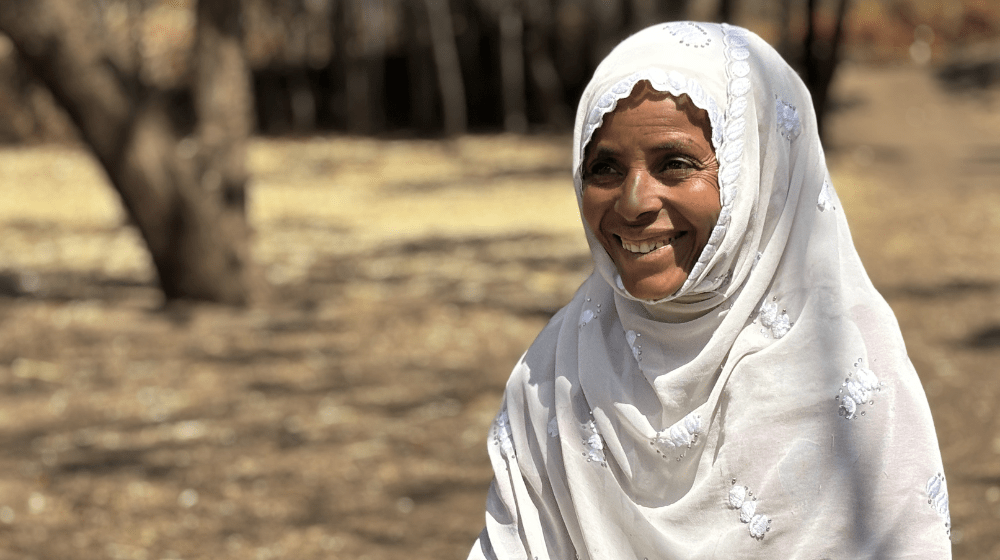Shukria Keda, 35, is a mother of five, from Ebo Tirora Kebele, Central Ethiopia region.
She has an infectious smile and a vibrant presence. Welcoming anyone who visits her small village, she often invites people for coffee and some local cheese.
However, behind this joyful persona lies trauma, pain, and unfulfilled dreams.
At the tender age of six, Shukria underwent Female Gentile Mutilation (FGM). She has a vivid memory of what happened that day surrounding the ceremony. ''I still remember what I wore that evening. My mom dressed me in a new dress with yellow and red patterns. I loved it so much. In our community, FGM is a ceremony, so my parents threw a party to celebrate. All of our relatives were there,” she said.
She couldn't comprehend what was going on until the time came. Watching how happy she was on that day, her family and relatives called her brave. ''The elders praised me, calling me strong because I didn't show any fear” she recalls with a laugh. “But that is because I did not know what was coming,''.
The next day, they woke her up early in the morning and told her it was time. “I remember the excruciating pain. I shouted and cried. I couldn't get away because two women were holding me down. My mom was standing by the door and I saw she was sad but didn't come to my rescue. That's how I knew that no one would stop the pain,”
Sadly, that wasn't the end of it for Shukria. Following tradition, women in the family had to check if there was any remaining flesh a week or two after the first cut, and if they thought there was still something remaining, the cut had to be done again. “It's amazing how much pain a body can take. That second cut almost killed me,” she said.
The healing process was long and painful. “It helped that I was so young and my body recovered faster. Otherwise, I think I would have died” she said.
In just another seven years, Shukria was to go through another dreadful practice - abduction for marriage. ''It was common back then,’’ she said.
One morning, as she always does, she went to the river with her friends to fetch water. Her current husband and his friend abducted her with force. She was just thirteen and had a dream of becoming a teacher. ''They just carried me, and took me to his relative’s house far away from the village so that no one could find me,” she recounts.
The next day, elders from her husband’s family arrived at her parents' house to formalize the marriage. According to tradition, her family can't refuse the request once the elders are at their gate. Unable to refuse the proposition, she got married.
''I didn't know what was expected of me. The first ten years were horrible, with difficult childbirth and so much pain. I gave birth to five kids, and each time, I thought I was going to die”, she recalls.“I also couldn't love my husband as they said I would”..
Of course, hers isn't an isolated story. Just a decade ago, Ebo Tirora Kebele had the highest FGM and child marriage cases. However, nowadays, women like Shukria are leading the charge for change.
As a mother of five with two girls, Shukria is vocal and determined that nothing like that would ever happen to her girls. She is active in her community and often speaks at anti-FGM meetings and community sessions about her experience. ''I am grateful for UNFPA's support. We are now creating more platforms to reach community members and elders. We are fighting back to save our daughters," she said.
Support by UNFPA-UNICEF Joint Programme on the Elimination of FGM
At the kebele levels, the Joint Programme provides capacity development training and necessary materials for community-based protection structures, such as Women Development Armies and Anti-HTP Committees, led by the Bureau of Women and Social Affairs.
The program supports activities that empower girls and families as well as increase community engagement to end FGM. In the Ebo Tirora kebele, there are nine community conversation groups consisting of elders, religious leaders, youth, and women. With the joint program technical and financial support, the group meets twice a month to discuss the prevention of FGM and child marriage.
The kebele administrator, Rawda Mohammed, appreciates the joint programm’s commitment. “We have been leading the movement with survivors like Shukria at the front. They are the ones who could speak about what it is like for a young girl to lose her future in the name of tradition, that isn’t serving anyone. The technical support from the joint program has allowed us to adopt approaches to reach the wider community’’ she said.


